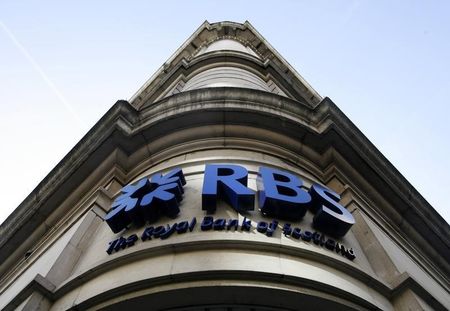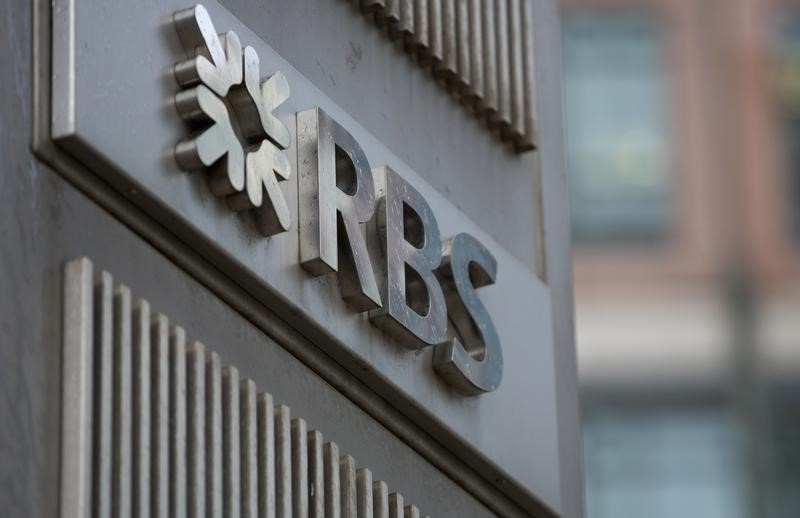By Matt Scuffham
LONDON (Reuters) - State-backed Royal Bank of Scotland (L:RBS) has set aside 400 million pounds ($640 million) to cover potential fines for manipulating currency markets and warned further charges for past misconduct would continue to hit its profits.
RBS, 80 percent owned by the British government following a 45 billion pound bailout during the financial crisis of 2007 to 2009, on Friday joined other big rivals in signalling it is close to agreeing settlements over alleged manipulation of the $5.3 trillion-a-day foreign exchange market.
Rival Barclays (L:BARC) said on Thursday it had set aside 500 million pounds to cover potential FX fines, while JP Morgan (N:JPM), UBS (VX:UBSN) and Citi (N:C) have also set aside large sums.
The forex manipulation, revelation of which came after banks were already under scrutiny for profiteering in the setting of benchmark lending rates such as Libor, relates to daily fixing rates which traders are alleged to have manipulated to suit their own market positions.
RBS also faces a number of other probes relating to past misdeeds which threaten to undermine its turnaround under Chief Executive Ross McEwan, who has steered the bank back into profit this year after it made a loss of 8.2 billion pounds in 2013.
"We are actively managing down a slate of significant legacy issues. This includes significant conduct and litigation issues that will continue to hit our profits in the quarters ahead," McEwan told reporters on Friday.
RBS is being investigated by regulators looking into its selling of bonds backed by residential mortgages in the United States and its treatment of struggling small British firms. The bank is also expected to be fined by British financial regulators for an IT failure two years ago which left customers without access to their bank accounts.
In addition, RBS faces a mounting bill to compensate customers mis-sold loan insurance. It set aside another 100 million pounds to deal with the matter on Friday, taking its total bill to 3.3 billion pounds.
GROUP SETTLEMENT
RBS is one of six banks in talks with UK regulators on a deal that would involve them paying about 1.5 billion pounds in a group settlement, sources have said. They said a deal could come in mid-November and U.S. regulators were also working on a group settlement.
McEwan said RBS wouldn't pay a dividend until it has more clarity over future misconduct charges and has substantially strengthened its capital position, potentially making it more difficult for the government to start selling its shares.
"I don't think we should be thinking about dividends until we've got a really good capital build and seen some of the bumps in the road out of the way," he said.
The bank, which had a core Tier 1 capital ratio of 10.8 percent at the end of the third quarter, has set a target of holding core capital of more than 12 percent by the end of 2016.
"There's no way we will be paying a dividend until we get ourselves well in advance of that 12 percent target," he said.
Britain's financial regulator expects banks to hold an absolute minimum of 7 percent core capital. However, investors generally expect a ratio of at least 10 percent.
RBS said it made a third-quarter pretax profit of 1.3 billion pounds, compared with a loss of 634 million the year before. That was ahead of an average analyst forecast of 1.1 billion compiled by the bank.
An economic revival in Britain and Ireland has enabled RBS to recover debts it had written off. The bank had a net release of previously written-off loans of 801 million pounds during the quarter, ahead of an average forecast of 590 million.
Shares in RBS, which have risen by more than a quarter in the past six months, were up 4.3 percent at 1000 GMT. They rose as high as 381.6 pence, their highest in 12 months.
RBS said it had decided to keep Ulster Bank, having carried out a review of the business which could have resulted in it being sold off. McEwan said the unit could deliver attractive shareholders returns in future.

(1 US dollar = 0.6263 British pound)
(Editing by Steve Slater and David Holmes)
